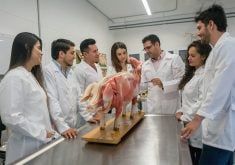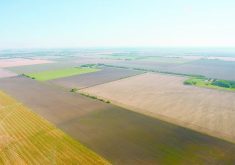The three prairie provinces are among six in Canada that are testing to see if aboriginal communities will set up 4-H clubs.
Alberta, Saskatchewan, Manitoba, Ontario, Nova Scotia and Newfoundland are piloting the effort by the Canadian 4-H Council.
Project manager Debra Hauer said a feasibility study conducted in 2003-04 found there is a place for 4-H in rural aboriginal communities.
Last month Agriculture Canada gave the national council $300,000 to implement 4-H programming for aboriginal youth.
“4-H in Canada plays a significant role in developing future leaders through its focus on healthy living, self-esteem and exciting hands-on project work,” said council president George Klosler.
Read Also

Students urged to consider veterinary medicine
Alberta government makes $86.5 million investment in University of Calgary to double capacity for its veterinary medicine program to address labour shortages in the field.
No one expects clubs to start up on reserves this winter. AnnMarie Nielsen Griffin of the Saskatchewan 4-H Council said the soonest may be in September.
“We’re a bit ahead of the game. We signed an (agreement) with FSIN (Federation of Saskatchewan Indian Nations) last year. We’re working to get a couple of clubs established, both in the northwest area.”
She said part of the problem is a scarcity of former 4-H members to become leaders on the reserves. There used to be an Indian 4-H program in the 1970s but it ended about 25 years ago. Nielsen Griffin said while nonaboriginals can act as mentors to First Nations people, the 4-H council wants the reserve clubs to run like the regular ones, using community resources and expertise.
She said aboriginal representatives told project organizers that their young people would be most interested in beef, light horse, bison and craft clubs. The Saskatchewan council has already hired writers to add cultural content to the 4-H courses, she said.
FSIN agrologist Ken Bear, who is in charge of developing the clubs, declined to comment on the project.
In Alberta, the 4-H movement wants “to step into this slowly,” said Marguerite Stark, head of the provincial agriculture department’s 4-H branch. She said 40 First Nations and Metis settlements had received some initial information from 4-H.
“We are looking and exploring. At this point we’re talking and hope to have a plan by the end of January.”
Manitoba has set up a group to work on creating awareness of the need to include aboriginal clubs in 4-H. Jodie Bezdzitny, manager of 4-H in the provincial agriculture department, said the group will contact a variety of aboriginal organizations in the province and follow up with individual meetings. Then it will create promotional material to be used at trade shows and with other organizations interested in aboriginal health and youth.
The Manitoba 4-H Council will be hiring a co-ordinator this winter to assist in its awareness plan, Bezdzitny said.














